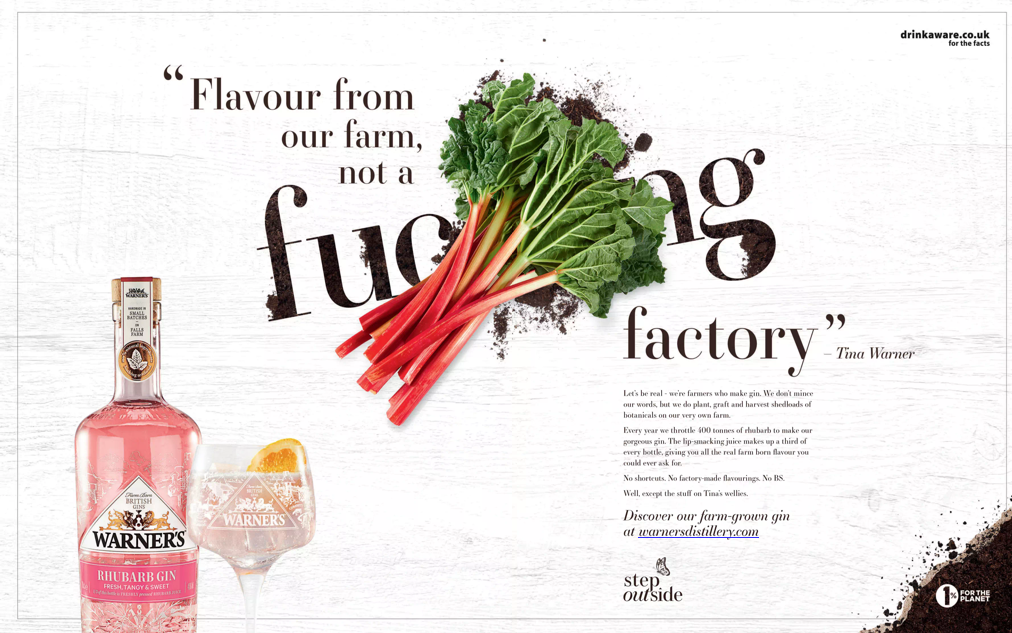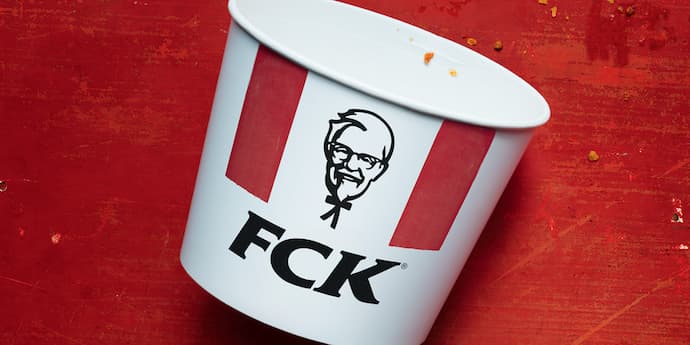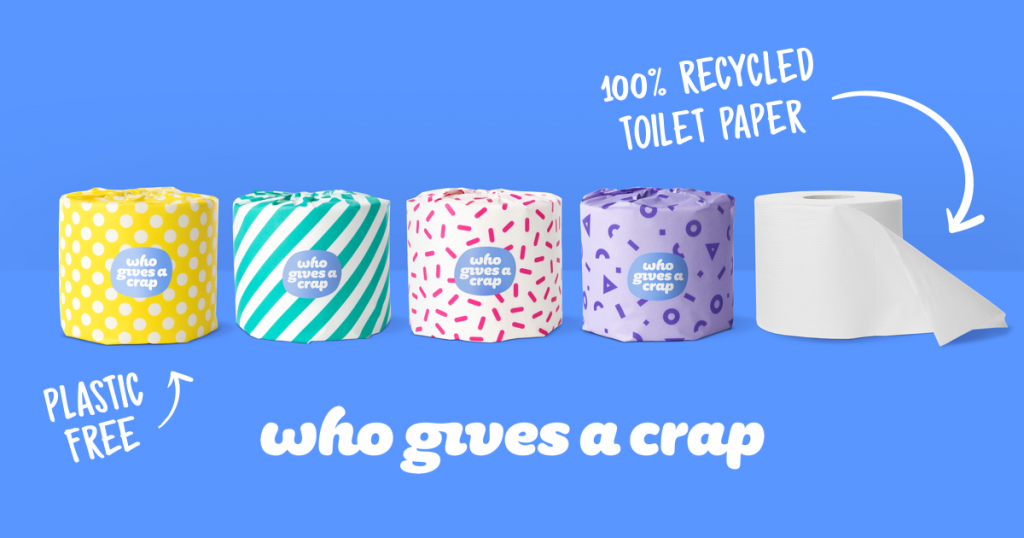
Swearing is not big, and it’s not clever.
Swearing is only done by people with a very limited vocabulary.
Yes, we’ve all heard our parents, our teachers, just about everybody say something like that at some point in time.
I can still remember old ladies fainting in the aisles of Boots when French Connection changed to FCUK. It certainly revived the brand’s fortunes for a long time. Until it all wore a bit thin, and we discovered there wasn’t much else to them.
So, why do brands swear?
Gin is normally quite a genteel world. And I certainly associate Warner’s with being of that ilk. So their latest advertising campaign caught my attention not just for the wording, but for the surprise at it coming from that brand. Which I guess is the power of strong copy and good advertising.

And that’s what swearing can do.
Make us stop.
But what if someone kicks off?
Swearing might put some people off, for sure. I was surprised to see a comment on a Facebook post from Clive at Rousdon Kitchen, never averse to a bit of strong language, admonishing him for admitting they’d “fucked up” during a busy service.
Seemed very strange to me. In fact I wondered at first if it was said tounge in cheek. But it seemed not.
If you know Clive’s reputation, then it wouldn’t be a surprise. And if you don’t know his reputation, then why would you follow him? Seems like some people are waiting to be disgusted. But from a brand perspective, it was completely in keeping.
You cannot be for everyone
I hate blandness in copy, in any wording, any content that a brand puts out there. And by not being bland you’re always going to piss someone off.
You’re not in business to make everyone happy. You’re here to find the people that are for you, not just along for the ride. Of course, swearing is not right for every business. I mean, you don’t want to see it from a brand aimed at children, for example.
So is swearing ever good?
The answer might be “quite possibly”. Insert your own additonal words in where you like.
Why?
Because science has proved that it is big and clever, it’s not because we don’t know any better words, and because good people swear all the time. Obviously, some good people don’t swear, but it’s not a guide to people not to do business with. Here’s some of the findings that might make you think again.
Swearing makes your argument more persuasive
Yes, a scattering of profanity can make your words more credible.
Don’t take my word for it.
A 2012 study led by the psychology department of the Erasmus University of Rotterdam found this to be the case.
Frequent cussers are more honest
A study showed that people who swear often actually lie less and have a higher degree of integrity. The research team found a positive link between profanity and honesty. People associated the swearing with less deception, that the swearer wasn’t trying to hide something.
What you saw/heard is what you get.
Good swearers have a good vocabulary
Here’s a surprising one. It’s not because people don’t know any better words; it’s because they know better words that they swear well. Timothy Jay, emeritus professor of psychology at Massachusetts College of Liberal Arts, says that linguistic snobbery and cultural stereotyping make us think that swearing comes from limited language choices.
Swearing surprises us, and other emotional responses
Compelling stories have to elicit an emotional response from us if we’re to get involved in them, remember them, and share them.
A bit like with the Warner’s adverts, where the element of surprise made me stop and re-evaluate. Or this classic from KFC when the chicken ran out, which did the same.

Of course, for some people, that response will be horror and disgust. For others, it will be surprise and laughter. It’ll get those hormones flowing (click here to read my piece on the importance of hormones in your content).
Swearing bonds us together
So if you’ve not gone off in a disgusted huff, then you might be feeling a stronger bond to that brand. By using a swear word or two, you’ve shown that you know and understand someone. You understand what’s enough of a shock factor to give them a giggle or to notice that you’ve slipped that word in. You’ve not gone so far as to shock or mortally offend anyone you want on your side.
When we feel understood, that drives an emotional response, and an emotional response is positive. You’re creating a sense of inclusion. It’s something you both get; you’re all in this together.
So how do you swear successfully?
As I said, there are some businesses where this is never going to be the right approach. But if you’re toying with it, here’s some things to think about.
Don’t cross the line
There are some swear words that are just much more likely to offend too many people. You’d have to be really sure of your niche to know you could go there, and also not care about offending others at all.
If you’re at all in doubt:
- Don’t do it
- Read the Ofcom report into language. That’ll be really clear on where the line is.
Don’t overdo it
I was interested whether the Warner’s was just an advertising approach or went deeper. While they don’t drop the F-bomb on their website, there were half a dozen references to bloody, one BS, and one bleedin’.
Not excessive then, and it’s been built into their total brand approach. It’s consistent.
Do it for a moment
I love the KFC ad. I think it was a brilliant response to a one-off event. There were probably more people who laughed than anything else—great use of colourful language.
Make it humorous and well thought through

Some people will not appreciate the word “crap”. Others will think that “Who Gives a Crap” is both a brilliant brand name for a toilet paper company and a good company to support.
Don’t make assumptions
Don’t think that just because your brand targets an “older” consumer that this is not for you. It’s worth remembering that Steve Jones and John Lydon, formerly of the Sex Pistols for those not sure and an infamous live TV swearing moment, are now in their mid-60s. Elton John, never averse to a good string of expletives even from the stage, is 74.
Test it
I’m guessing Warner’s did this before they adopted this as a strategy. For those of us with smaller businesses, you could do some A/B type testing with your emails (most of the providers offer this even with the free plans). Or try it with Instagram posts with different captions.
Or just say “f*ck it” and dive right on in. If they are really your audience, then they’ll be with you.
Put it this way, I’m still in the market for Warner’s Gin and looking forward to getting to Rousdon Kitchen at some point soon.